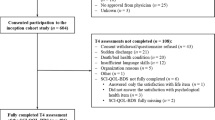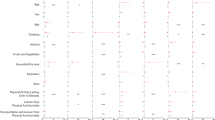Abstract
Study design:
Prospective parallel waitlist randomised controlled trial.
Objectives:
Evaluate the feasibility and effectiveness of an Internet-based psychological intervention treating comorbid mood disorder in adults with spinal cord injury (SCI). Improved mood and satisfaction with life were primary outcomes.
Setting:
Victoria, Australia.
Intervention:
Electronic Personal Administration of Cognitive Therapy (ePACT).
Measures:
Depression, Anxiety and Stress Scale–Short Form (DASS21), Personal Well-being Index, Helplessness subscale of the Spinal Cord Lesion Emotional Well-being Scale v1 Australia, at each time point.
Participant qualifying criteria:
Adults (18–70 years), chronic SCI, attend SCI review clinic at Austin or Caulfield Hospital and score above normative threshold of the Depression, Anxiety and Stress Scale–Short Form (DASS21).
Methods:
Forty-eight participants completed Time 2 post intervention (n=23) or time equivalent for waitlist control group (n=25) telephone interviews. The measures were repeated a third time (Time 3) for a small subgroup (n=12) at 6 months post intervention within the study implementation time frame.
Results:
Univariate within group analyses revealed significant improvement in mood in the intervention group at Time 2: (lower depression (effect size (ES)=0.4), anxiety (ES=0.4) and stress (ES=0.3)) and higher satisfaction with life (ES=0.2). Waitlist control group improved in depression only (ES=0.3) by Time 2. Multilevel variance components analyses, although not as positive, were still encouraging. Improvement in mood symptoms was maintained in the small group reinterviewed at Time 3.
Conclusion:
Although Internet-based interventions for mental health issues in SCI not a solution for all, our results indicate that they are a potentially valuable addition to the currently available options.
Similar content being viewed by others
Log in or create a free account to read this content
Gain free access to this article, as well as selected content from this journal and more on nature.com
or
References
Migliorini C, Tonge B, Taleporos G . Spinal cord injury and mental health. Aust N Z J Psychiatry 2008; 42: 309–314.
Williams R, Murray A . Prevalence of depression following spinal cord injury: a meta-analysis. Arch Phys Med Rehabil 2014; 96: 133–140.
Fann JR, Bombardier CH, Richards JS, Tate DG, Wilson CS, Temkin N et al. Depression After Spinal Cord Injury: Comorbidities, Mental Health Service Use, and Adequacy of Treatment. Arch Phys Med Rehabil 2011; 92: 352–360.
Migliorini C, New PW, Tonge B . Comparison of depression, anxiety and stress in persons with traumatic and non-traumatic spinal cord injury. Spinal Cord 2009; 47: 783–788.
DeJong G, Hoffman J, Meade M, Bonbardier C, Deutsch A, Nemunaitis G et al. Postrehabilitative Health Care for Individuals with SCI: Extending Health Care into the Community. Topics Spinal Cord Injury Rehabil 2011; 17: 46–58.
Liss HJ, Glueckauf RL, Ecklund-Johnson EP . Research on telehealth and chronic medical conditions: Critical review, key issues, and future directions. Rehabil Psychol 2002; 47: 8.
Andersson G, Cuijpers P . Internet-based and other computerized psychological treatments for adult depression: a meta-analysis. Cogn Behav Ther 2009; 38: 196–205.
Kaltenthaler E, Brazier J, De Nigris E, Tumur I, Ferriter M, Beverley C et al. Computerized cognitive behavior therapy for depression and anxiety update: A systematic review and economic evaluation. Health Technol Assess 2006; 10: 1–70.
Spek V, Cuijpers P, Nyklícek I, Riper H, Keyzer J, Pop V et al. Internet-based cognitive behaviour therapy for symptoms of depression and anxiety: A meta-analysis. Psychol Med 2007; 37: 319–328.
Migliorini C, Tonge B, Sinclair A . Developing and piloting ePACT: a flexible psychological treatment for depression in people living with chronic spinal cord injury. Behav Change 2011; 28: 45–54.
Migliorini C, Sinclair A, Brown D, Tonge B, New P . Prevalence of mood disturbance in Australian adults with chronic spinal cord injury. Intern Med J 2015; 45: 1014–1019.
Lovibond SH, Lovibond PF. Manual for the Depression Anxiety Stress Scales 2 edn. Psychology Foundation of Australia Inc: Sydney, Australia. 1995.
International Wellbeing Group Personal Wellbeing Index. Deakin University, Australian Centre on Quality of Life: Melbourne, VIC, Australia. 2006.
Migliorini C, Elfström ML, Tonge B . Translation and Australian validation of the spinal cord lesion-related coping strategies and emotional wellbeing questionnaires. Spinal Cord 2008; 46: 690–695.
Cohen J . Statistical Power Analysis for the Behavioral Sciences 2 edn. Lawrence Erlbaum Associates: HIllsdale, New Jersey. 1988.
Kwok O-M, Underhill AT, Berry JW, Luo W, Elliott TR, Yoon M et al. Analyzing longitudinal data with multilevel models: an example with individuals living with lower extremity intra-articular fractures. Rehabil Psychol 2008; 53: 370–386.
Kreft I, de Leeuw J . Introducing Multilevel Modeling. Sage Publications: London. 1999.
Beck JS . Cognitive Behavior Therapy: Basics and Beyond. The Guildord Press: New York, New York. 2011.
Dorstyn D, Mathias J, Denson L . Efficacy of cognitive behavior therapy for the management of psychological outcomes following spinal cord injury: A meta-analysis. J Health Psychol 2010; 16: 374–391.
Seligman M, Steen T, Park N, Peterson C . Positive psychology progress: empirical validation of interventions. Am Psychol 2005; 60: 410–421.
Sin NL, Lyubomirsky S . Enhancing well-being and alleviating depressive symptoms with positive psychology interventions: a practice-friendly meta-analysis. J Clin Psychol 2009; 65: 467–487.
Hofmann S, Sawyer A, Witt A, Oh D . The effect of mindfulness-based therapy on anxiety and depression: a meta-analytic review. J Consult Clin Psychol 2010; 78: 169–183.
Layous K, Chancellor J, Lyubomirsky S, Wang L, Doraiswamy P . Delivering happiness: translating positive psychology intervention research for treating major and minor depressive disorders. J Altern Complement Med 2011; 17: 675–683.
Christensen H, Griffiths KM, Farrer L . Adherence in internet interventions for anxiety and depression: systematic review. J Med Internet Res 2009; 11: e13.
Andrews G, Cuijpers P, Craske M, McEvoy P, Titov N . Computer therapy for the anxiety and depressive disorders is effective, acceptable and practical health care: A meta-analysis. PLoS ONE 2010; 5: e13196.
Donkin L, Christensen H, Naismith SL, Neal B, Hickie IB, Glozier N et al. A systematic review of the impact of adherence on the effectiveness of e-Therapies. J Med Internet Res 2011; 13: e52.
National Institute for Mental Health Research. MoodGYM: frequently asked questions. n.d. Available from: https://moodgym.anu.edu.au/welcome/faq (11 December 2014).
Griffiths KM, Christensen H . Internet-based mental health programs: A powerful tool in the rural medical kit. Aust Jf Rural Health 2007; 15: 81–87.
Donkin L, Hickie IB, Christensen H, Naismith SL, Neal B, Cockayne NL et al. Sampling bias in an internet treatment trial for depression. Transl Psychiatry 2012; 2: e174.
Janosky JE . The ethics of underpowered clinical trials. JAMA 2002; 288: 2118–2119.
Rosoff PM . Can Underpowered Clinical Trials Be Justified? IRB 2004; 26: 16–19.
Craig A, Tran Y, Middleton J . Psychological morbidity and spinal cord injury: a systematic review. Spinal Cord 2008; 47: 108–114.
Acknowledgements
We thank Dr John Taffe, biostatistician, Centre for Developmental Psychiatry and Psychology, for his technical assistance. We also thank Drs Brian Anthonisz, Cristina Manu, Parinaz Sharifi and especially Ms Marie Mallawarachchy for their assistance in the screening of patients at the Caulfield Hospital. This work was supported by beyondblue: Victorian Centre of Excellence 2011 Research Grant Round: Randomised control trial of ePaCT: a flexible treatment for depression and anxiety in adults living with chronic spinal cord injury. This work was supported by beyondblue: Victorian Centre of Excellence 2011 Research Grant. The RCT was registered at A&NZ Clinical Trial Registry (ACTRN 12612000587808).
Author information
Authors and Affiliations
Corresponding author
Ethics declarations
Competing interests
The authors declare no conflict of interest.
Rights and permissions
About this article
Cite this article
Migliorini, C., Sinclair, A., Brown, D. et al. A randomised control trial of an Internet-based cognitive behaviour treatment for mood disorder in adults with chronic spinal cord injury. Spinal Cord 54, 695–701 (2016). https://doi.org/10.1038/sc.2015.221
Received:
Revised:
Accepted:
Published:
Issue date:
DOI: https://doi.org/10.1038/sc.2015.221
This article is cited by
-
The impact of technology systems and level of support in digital mental health interventions: a secondary meta-analysis
Systematic Reviews (2023)
-
Internet-based and mobile-based cognitive behavioral therapy for chronic diseases: a systematic review and meta-analysis
npj Digital Medicine (2023)
-
Current Approaches in Telehealth and Telerehabilitation for Spinal Cord Injury (TeleSCI)
Current Physical Medicine and Rehabilitation Reports (2022)
-
Guided internet-delivered cognitive-behaviour therapy for persons with spinal cord injury: a feasibility trial
Spinal Cord (2020)
-
Work and SCI: a pilot randomized controlled study of an online resource for job-seekers with spinal cord dysfunction
Spinal Cord (2019)



